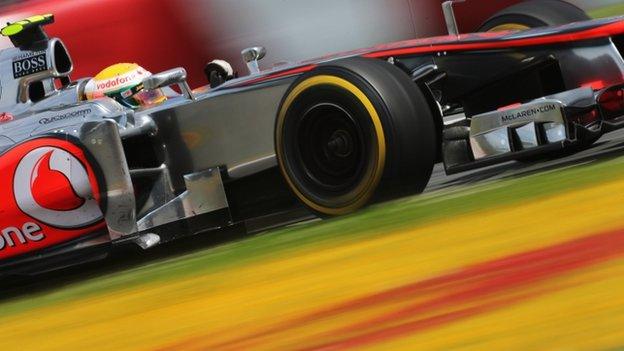Cost control set to be written into F1 rules for first time
- Published

Lewis Hamilton wins in Canada
Formula 1 is poised to have cost control written formally into its rules for the first time next year.
Governing body the FIA said on Friday that it was having "active discussions with teams regarding cost control".
BBC Sport understands that the FIA and teams are working on an agreement that will enshrine a form of cost control over car design into the regulations.
An FIA statement said the "intention is to help all teams participate in a fair and equal manner".
The teams are all concerned about F1's costs in the context of continuing global economic problems, particularly in the Eurozone.
Sources say an agreement on how to limit spending on chassis is "not very far off", but emphasise that talks are still ongoing.
This deal will most likely not take the form of a formal cap on budgets, but rather adopt a form of restriction on the way the teams can commit their resources.
The F1 teams are already working to a Resource Restriction Agreement, but it has been fraught with difficulties, with accusations that various teams are breaching its terms.
Despite that discontent, all the teams recognise that restricting expenditure is crucial and it has been agreed by most that the most effective way to police it is for it to be detailed in the FIA technical regulations.
"The expectation is there will be something," said a source close to the negotiations. "There has to be something. All parties are committed to it. There is a concerted philosophy towards cost reduction."
A statement from the FIA on Friday following a meeting of its World Motorsports Council (WMSC) - effectively the organisation's legislative body - said that "any amendments to the technical regulations resulting from a further limit on expenditure on the chassis will be submitted to the WMSC via a fax vote before 30 June".
However, this date is understood to be a target with the intention of focusing minds rather than a firm deadline and talks could stretch beyond that date.
The FIA is also looking at finding a way of restricting resources - and therefore cutting costs - on engines.
The subject of the change in engine formula due for 2014, when 1.6-litre V6 turbo engines will replace the current 2.4-litre normally aspirated V8s, was not discussed at the World Council.
The potential expense of the engines is causing concern among the F1 teams.
But FIA president Jean Todt said that he was working to keep costs down.
"It is true that the [2014] package will be more expensive, but it is also true that the FIA has been in consultation with the engine suppliers in order to reduce the cost increase," he told Autosport before the World Council meeting.
"For example we have already agreed to a reduction in the number of power units. From eight per driver per season in 2012, we will reduce this to five per driver in 2014 and to four per driver per season in 2015."
The FIA also said that it was having "constructive" discussions with F1 commercial boss Bernie Ecclestone over the renewal of the Concorde Agreement - the secret contract that binds the teams, the FIA and the commercial rights holder, which Ecclestone represents, together.
There was "the intention of finalising an agreement in the coming weeks", the FIA said.
The statement added that the deadline for entries for next year's world championship had been deferred from 15 July until 30 September.